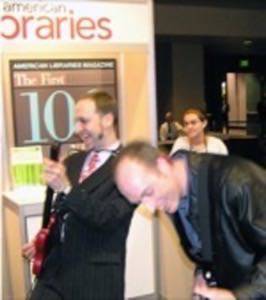At the risk of jinxing things – I think it’s pretty clear that there’s a historic shift underway between activities we used to engage in offline and things we now do online. It’s no surprise, for example, that CD sales were down 20% this US holiday season while online shopping was up 19%. That’s how it works, right? People are moving from one marketplace to another, more virtual one.

Another dataset released this weekend, however, paints a more complex picture. According to the newest study from the Pew Internet and American Life Center – the youngest, most affluent and most internet-connected adults in the US are also the most likely to visit a physical library. It wasn’t that way just 10 years ago. How many other legacy industries can you think of today that can say their strongest growth is among young, affluent, power-internet users? Something is going very right in library land. The music business ought to pay close attention to what’s going on there.
As many librarians (and perhaps the most savvy people in the music business) can tell you, the internet does not have to replace offline activities one-to-one, as a zero-sum game. Both planes, if you will, can provide essential value ads to each other – and thus “make the pie higher,” as they say.
The Pew study found that 62 percent of Americans aged 18-30 are active library users, the percentage drops sharply at age 50 and falls to 32 percent of those 72 and up. Library use is highest, the study found, among young people who have internet access at home. Just a handful of years ago it was widely believed that home internet access would be the death of the public library.
CNN’s coverage of the study is excellent and includes the following:
“It was truly surprising in this survey to find the youngest adults are the heaviest library users,” [Pew director Lee] Rainie said. “The notion has taken hold in our culture that these wired-up, heavily gadgeted young folks are swimming in a sea of information and don’t need to go to places where information is.”
Leigh Estabrook, a retired professor of information science and sociology at the University of Illinois, said young adults used to finding information online are likely to crave even more and realize they need to turn to libraries to get it.
Rainie added that young adults are the ones likely to have visited libraries as teens and seen their transformation into information hubs, with computers and databases alongside stacks of printed books.
Earlier this month we ran a post here titled Sexy Librarians of the Future Will Help You Upload Your Videos to YouTube. In that post we discussed Jon Udell’s theory that librarians of the future could play a key roll in facilitating the rise of User Generated Content online.
Whether that vision is truly futuristic or something many librarians are already doing, libraries are clearly offering the kind of added value that bookstores, mom-n-pop stores and other struggling markets are trying to use to survive the coming of the internet. Events and human customer service are two things that all of these institutions can offer.
Things that libraries are unique in offering, though, include well organized information, direct access to people with unusually strong internet skills (your librarian can probably Google circles around you, for example) and an oasis of braininess in an increasingly insipid culture of nihilism.
It’s been years since I was a mini-librarian (GovDocs reference as work study!) so I won’t pretend to be up on the state of the art – but there are plenty of Library 2.0 blogs online to get a taste of the field.
It is clear, however, that the library still has a lot to teach us about thriving in this digital era. Traditional institutions and the Internet can have symbiotic relationships, each making the other stronger and more important than ever.
Img credit: The Guitar Heroes of the American Library Association’s Midwinter 2007 conference. CC by Flickr user Libraryman. Note: I feel funny about the focus on “affluent young people” in this post as yuppie kids in the library isn’t the goal, thank goodness, but I’m drawing a comparison with the private sector. Note the limitations of the analogy.










